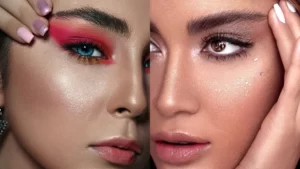Does Oily Skin Delay Aging? Numerous people view an oily skin type as a burden, mainly due to its association with acne, frequent breakouts, and larger pore size. However, there is speculation about the potential advantages of oily skin, especially in relation to aging. Despite the common assumption that dry skin ages better, various experts suggest that oily skin could have protective effects against the development of wrinkles and fine lines.
In this article, we will explore the science behind oily skin, examine the potential benefits and drawbacks of having oily skin, and look at the research on how oily skin may affect the aging process.
Table of Contents
Does Oily Skin Age Better?
There is some evidence to suggest that oily skin may have some benefits when it comes to aging. One theory is that the natural oils produced by the sebaceous glands may help to keep the skin moisturized, which can prevent wrinkles and fine lines. Additionally, sebum contains antioxidants that can protect the skin from environmental damage. Research has also suggested that sebum may play a role in collagen production, which is essential for maintaining the elasticity and firmness of the skin.
However, it’s important to note that while oily skin may have some benefits in terms of aging, it also has its own set of drawbacks. Oily skin can exacerbate the appearance of aging by enlarging pores, and can also lead to acne and breakouts which can leave scars and dark spots on the skin. Additionally, oily skin can be difficult to manage and treat, as it can be resistant to many skincare products.
It’s also worth noting that the research on the relationship between oily skin and aging is limited and more studies are needed to fully understand the potential benefits and drawbacks of oily skin. Additionally, it’s not just about the skin type, but also the individual’s genetics, lifestyle, and skincare routine that plays a crucial role in how the skin ages. Therefore, a healthy lifestyle and good skincare routine are important for anyone, regardless of their skin type, to maintain a youthful appearance. So, it’s not accurate to say that oily skin ages better, but it can have some benefits that can help to delay aging.
The Science Behind Oily Skin
The science behind oily skin is related to the production of sebum, which is an oily, waxy substance that is produced by the sebaceous glands. These glands are found in the skin all over the body but are most concentrated on the face, scalp, and chest. Sebum is important for keeping the skin moisturized and protecting it from environmental damage. However, when the sebaceous glands produce too much sebum, it can lead to oily skin.
There are several factors that can contribute to the production of excessive sebum, including genetics, hormonal changes, and certain medications. For example, during adolescence, the body produces more androgens, which are hormones that stimulate the sebaceous glands to produce more sebum. This is why acne is common during puberty. Similarly, some women may experience oily skin as a result of hormonal fluctuations during menstrual cycles or pregnancy.
The characteristics of oily skin include a shiny appearance, large pores, and a tendency to develop acne or breakouts. Oily skin can also be prone to blackheads and whiteheads. It’s important to note that oily skin can be caused by various factors, it is a good idea to consult a dermatologist to know the root cause and get the best treatment for it.
Oily Skin and Aging

While oily skin can be a source of frustration for many people, some experts suggest that it may have benefits when it comes to aging. One theory is that the natural oils produced by the sebaceous glands may help to keep the skin moisturized, which can prevent wrinkles and fine lines. Additionally, sebum contains antioxidants that can protect the skin from environmental damage.
Research has also suggested that sebum may play a role in collagen production. Collagen is a protein that is essential for maintaining the elasticity and firmness of the skin. As we age, collagen production decreases, leading to wrinkles and fine lines. Studies have found that sebum can help to stimulate collagen production, which may help to keep the skin looking youthful.
However, it’s important to note that while oily skin may have some benefits in terms of aging, it also has its own set of drawbacks. Oily skin can exacerbate the appearance of aging by enlarging pores, and can also lead to acne and breakouts which can leave scars and dark spots on the skin. It’s important that you have a good skincare routine to manage oily skin.
Potential Drawbacks of Oily Skin
One of the most significant potential drawbacks of oily skin is the risk of acne and breakouts. Oily skin is more likely to develop clogged pores, which can lead to the formation of blackheads, whiteheads, and pimples. These blemishes can be unsightly and can also lead to scarring or dark spots if not treated properly. Additionally, oily skin can exacerbate the appearance of aging by enlarging pores.
Another potential drawback of oily skin is that it can be difficult to manage. People with oily skin may find that their makeup slides off or their hair becomes greasy quickly. They may also have to wash their face multiple times a day to keep it looking clean and fresh. Oily skin can also cause embarrassment and low self-esteem.
Additionally, oily skin can be difficult to treat, as it can be resistant to many skincare products. People with oily skin may have to try several different products before finding something that works for them. Some of the most effective products for oily skin are those that contain salicylic acid, benzoyl peroxide, retinoids, or other ingredients that help to unclog pores and control sebum production.
FAQ:
Is Oily Skin Good for Ageing?
There is some evidence to suggest that oily skin may have some benefits when it comes to aging. One theory is that the natural oils produced by the sebaceous glands may help to keep the skin moisturized, which can prevent wrinkles and fine lines. Additionally, sebum contains antioxidants that can protect the skin from environmental damage. Research has also suggested that sebum may play a role in collagen production, which is essential for maintaining the elasticity and firmness of the skin.
However, it’s important to note that while oily skin may have some benefits in terms of aging, it also has its own set of drawbacks. Oily skin can exacerbate the appearance of aging by enlarging pores, and can also lead to acne and breakouts which can leave scars and dark spots on the skin. Additionally, oily skin can be difficult to manage and treat, as it can be resistant to many skincare products.
It’s also worth noting that the research on the relationship between oily skin and aging is limited and more studies are needed to fully understand the potential benefits and drawbacks of oily skin. Additionally, it’s not just about the skin type, but also the individual’s genetics, lifestyle, and skincare routine that plays a crucial role in how the skin ages. Therefore, a healthy lifestyle and good skincare routine are important for anyone, regardless of their skin type, to maintain a youthful appearance.
What are the benefits of having oily skin?

There are some potential benefits of having oily skin, specifically in terms of aging. Some of the benefits include:
- Moisturization: Oily skin can help to keep the skin moisturized, which can prevent wrinkles and fine lines.
- Antioxidant protection: Sebum, the oily substance produced by the sebaceous glands, contains antioxidants that can protect the skin from environmental damage.
- Collagen production: Studies have suggested that sebum may play a role in collagen production, which is essential for maintaining the elasticity and firmness of the skin.
- Fewer wrinkles: Oily skin may have a protective effect on the skin, preventing wrinkles, and fine lines that can occur due to dryness.
- Delayed aging: Research suggests that people with oily skin tend to age later than those with dry skin, due to the natural moisturizing effect of the sebum.
What skin type ages best?
Many people believe that dry skin ages better than other skin types. This is because dry skin tends to be less prone to acne, breakouts, and other forms of inflammation, which can cause damage to the skin and accelerate the aging process. Additionally, dry skin tends to have fewer wrinkles and fine lines than oily or combination skin.
However, it’s important to note that while dry skin may have some benefits in terms of aging, it also has its own set of drawbacks, such as dryness, irritation, and flakiness. Also, skin aging is a complex process influenced by a variety of factors such as genetics, lifestyle, sun exposure, and skincare routine.
Aging well is not only about the skin type but also about how you take care of your skin and your overall health. A good skincare routine, healthy diet, regular exercise, and avoiding smoking and excessive alcohol consumption can all help to maintain the health and youthful appearance of the skin. Additionally, It’s important to protect your skin from sun exposure and use sunscreen regularly, as UV rays can accelerate the aging process.
Do oily people wrinkle less?
As I mentioned before, the natural oils produced by the sebaceous glands in oily skin may help to keep the skin moisturized, which can prevent wrinkles and fine lines. Additionally, sebum contains antioxidants that can protect the skin from environmental damage. Research has also suggested that sebum may play a role in collagen production, which is essential for maintaining the elasticity and firmness of the skin.
Which is better oily or dry skin?
Each skin type has its own advantages and disadvantages.
Oily skin has the potential benefit of keeping the skin moisturized, which can prevent wrinkles and fine lines. Additionally, sebum contains antioxidants that can protect the skin from environmental damage. However, oily skin can also lead to acne and enlarged pores, and can be difficult to manage and treat.
Dry skin, on the other hand, tends to be less prone to acne, breakouts, and other forms of inflammation, which can cause damage to the skin and accelerate the aging process. Additionally, dry skin tends to have fewer wrinkles and fine lines than oily or combination skin. However, dry skin can also be prone to dryness, irritation, and flakiness.
Ultimately, the best skin type is the one that is healthy and well-cared for. A good skincare routine, healthy diet, regular exercise, and avoiding smoking and excessive alcohol consumption can all help to maintain the health and youthful appearance of the skin, regardless of your skin type. Additionally, it’s important to protect your skin from sun exposure and use sunscreen regularly, as UV rays can accelerate the aging process.




